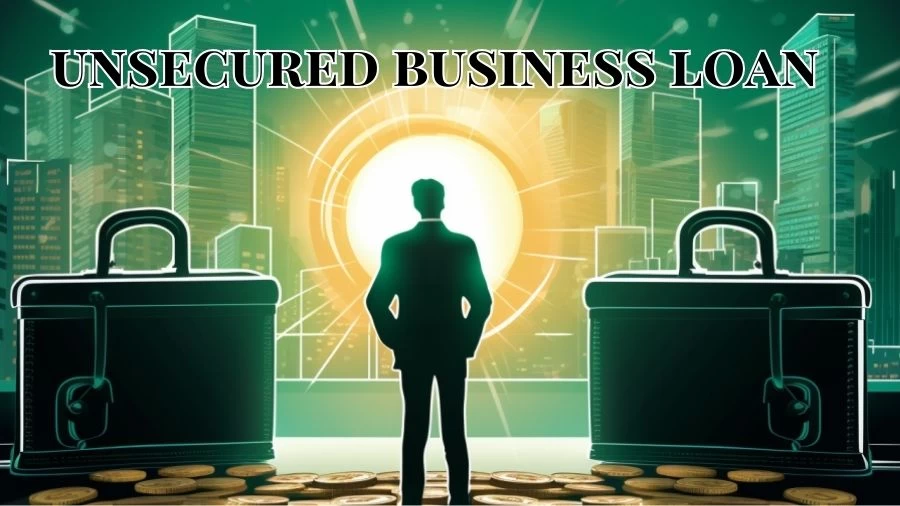
Unsecured Business Loan, Is a Small Business Loan Secured or Unsecured?
Unsecured business loans, including term loans, credit lines, and cash advances, don't necessitate collateral, while the secured or unsecured nature of small business loans is contingent on creditworthiness and often involves higher rates and stricter eligibility criteria.
by Sangamithra
Published Aug 19, 2023 | Updated Aug 19, 2023 | 📖 10 min read
On This Page
- Unsecured Business Loan
- Is a Small Business Loan Secured or Unsecured?
- Unsecured Small Business Loan
- How to Choose Between a Secured or Unsecured Business Loan?
- How Does Unsecured Business Loan Function?
- What are the Distinctions Between Secured and Unsecured Business Loans?
- What is the Process for Obtaining an Unsecured Business Loan?
- What Do You Need to Qualify for an Unsecured Business Loan?
- What are the Advantages and Disadvantages of Secured Loans?
- What are the Advantages and Disadvantages of Unsecured Loans?
Unsecured Business Loan
Unsecured business loans stand as a variety of business financing where borrowers aren't required to pledge collateral to secure the loan amount. Just as diverse categories of business loans exist, unsecured business loans come in various formats, each showcasing distinct attributes and applications. Among the typical unsecured business loans are:
Term Financing: Term loans represent the conventional concept of business loans, wherein a bank lends a specific sum of money. Interest accrues over time, and borrowers make regular payments over a predetermined loan period. This financing form is particularly suitable for business proprietors seeking a lump sum cash infusion, as opposed to smaller, staggered disbursements over months or years.
Business Credit Lines: Differing from term loans, business lines of credit provide borrowers with access to funds up to a predetermined limit, usable as needed. Interest is charged solely on the outstanding balance, rather than the entire loan amount. Borrowers can repeatedly tap into the funds once they've repaid the utilized portion. This flexibility makes credit lines an optimal choice for business owners requiring a revolving resource to cover ongoing expenditures.
Merchant Cash Advances (MCAs): Merchant cash advances involve a business borrowing funds from a credit card processor or another merchant services provider at a specified factor rate (typically ranging from 1.2 to 1.5). In exchange for these funds, a portion of future transactions is allocated. Payments occur through automated clearing house (ACH) transfers on a daily or weekly basis until the borrowed amount is settled. MCAs are most suitable for enterprises in urgent need of cash, with substantial sales volume to support repayment.
Invoice Factoring: Invoice factoring entails the sale of outstanding invoices to a specialized company at a reduced rate. This prompts an upfront payment equivalent to a portion of the invoice total. The responsibility for collecting payment on the invoices then shifts to the factoring company.
Is a Small Business Loan Secured or Unsecured?
A small business loan can be either secured or unsecured, depending on the type of loan and the terms set by the lender. Secured small business loans require the borrower to provide collateral, such as assets or property, as a form of security for the loan.
This collateral acts as a guarantee for the lender that if the borrower defaults on the loan, they can seize the collateral to recover their losses. On the other hand, unsecured small business loans do not require any collateral. These loans are granted based on the borrower's creditworthiness, business history, and other financial factors.
Since there is no collateral involved, unsecured loans carry a higher risk for the lender, which often results in higher interest rates and stricter eligibility criteria. Ultimately, whether a small business loan is secured or unsecured depends on the specific loan agreement and the preferences of both the borrower and the lender.
Unsecured Small Business Loan
Unsecured business loans provide a viable alternative for small business owners who might face challenges in offering collateral or personal assets as security for loan repayment. Unlike traditional lending practices that often require collateral, unsecured loans cater to entrepreneurs seeking swift access to funds, particularly during critical situations or when seizing opportunities necessitates working capital.
Unsecured small business loans prove to be an optimal solution for enterprises with limited collateral or a less-than-perfect credit history or credit score. These loans come in various forms, encompassing business lines of credit, SBA loans, and minority loans. Delving into each category of unsecured loans and their potential availability through offerings like American Express Business Blueprint Funding™ can provide a comprehensive understanding.
Ideal for entrepreneurs and small business owners looking for streamlined and efficient pathways to small business funding, unsecured loans emerge as a practical choice. Especially in scenarios involving unforeseen expenses, embracing an unsecured loan could empower businesses to sustain growth and continuity effectively.
How to Choose Between a Secured or Unsecured Business Loan?
When an individual or business faces the decision between secured and unsecured business loans, the array of advantages and disadvantages can complicate the choice. The initial step involves assessing eligibility for each type of loan.
Secured loans might hold greater appeal when:
- The borrower's credit score doesn't stand on firm ground. For new businesses or those lacking the credit score required for an unsecured loan, a secured option emerges as a viable alternative.
- Favorable loan terms are a priority. Due to the collateral requirement, secured loans frequently offer more favorable terms, such as a lower interest rate, extended repayment timeline, or both.
Conversely, unsecured loans may be more fitting under the following circumstances:
- The borrower lacks assets or prefers not to jeopardize them. Individuals seeking to avoid putting assets at risk or those without suitable collateral could find unsecured loans appealing.
- Uncertainty surrounds cash flow. If concerns about timely repayments persist, the slightly elevated cost of an unsecured loan could be a justifiable trade-off.
- Urgent access to funds is crucial. Unsecured loans serve as a suitable solution for pressing financial needs, as they bypass the collateral appraisal stage, expediting the approval process.
In cases where eligibility extends to both loan types, a comprehensive evaluation of their merits and potential drawbacks remains essential in determining the optimal choice.
How Does Unsecured Business Loan Function?
Unsecured business loans function by providing borrowers with a financing option that doesn't necessitate offering their business assets as collateral. This arrangement reduces the risk for borrowers, though it elevates the risk profile for lenders.
To establish their credibility and minimize risk, lenders often impose stringent eligibility prerequisites for certain categories of unsecured business loans. Generally, a commendable credit history ranging from good to excellent, a business track record of at least two years, and a substantial annual revenue are typically required.
Instead of relying on collateral, lenders commonly require both business owners and themselves to provide a personal guarantee. This guarantee holds all signatories accountable for the business debt. Should the business encounter difficulties in repaying the unsecured loan, the legal obligation falls upon you to clear the debt. Lenders retain the authority to pursue legal avenues, potentially entailing the seizure of personal assets, to aid in repaying the debt.
What are the Distinctions Between Secured and Unsecured Business Loans?
The primary distinction separating a secured business loan from an unsecured business loan lies in the utilization of collateral. This collateral serves as an added assurance for lenders, aiding in minimizing their risk when providing small-business loans.
Here’s a table of the differences between secured and unsecured business loans:
|
Aspects |
Secured Business Loans |
Unsecured Business Loans |
|
Loan Amount |
Larger borrowing amounts. |
Smaller borrowing amounts. |
|
Loan Terms |
Longer repayment period. |
Shorter repayment period. |
|
Interest Rates |
Lower interest rates. |
Higher interest rates. |
|
Funding Speed |
Slower to fund. Requires collateral appraisal. |
Faster to fund. |
|
Qualification Requirements |
Can be easier to qualify for. Prioritizes collateral value. |
Can be harder to qualify for. Focuses on credit score and business history. |
What is the Process for Obtaining an Unsecured Business Loan?
The process of obtaining an unsecured business loan involves several key steps:
Research and Preparation: Begin by researching different lenders and their offerings. Understand the terms, interest rates, and eligibility criteria of various unsecured business loan options. Prepare your business and financial documentation, including business plan, financial statements, and credit history.
Application: Complete the application form provided by the chosen lender. The application will typically require information about your business, its financials, your personal credit history, and the purpose of the loan.
Submission: Submit the completed application along with the required documentation. Online lenders may facilitate a digital submission process, while traditional institutions might require in-person visits.
Review and Underwriting: The lender reviews your application and documents. They assess your creditworthiness, business stability, and financial health. This process may involve a credit check and verification of the provided information.
Loan Offer: If your application is approved, the lender will provide you with a loan offer outlining the loan amount, interest rate, repayment terms, and any associated fees.
Acceptance: Review the loan offer thoroughly. If you agree to the terms, provide your acceptance and any additional requested information.
Verification and Due Diligence: The lender may conduct further due diligence, such as confirming your business details and financials. This step ensures accuracy and authenticity.
Approval and Documentation: Once due diligence is complete, the lender approves the loan. You'll receive loan documents outlining all terms and conditions. Carefully review and sign these documents.
Funding: After you've signed the loan documents, the lender disburses the funds to your business account. The time it takes to receive the funds can vary depending on the lender and the application process.
Repayment: Begin making regular payments as per the agreed-upon schedule. Payments include both principal and interest amounts. Timely repayments positively impact your credit and relationship with the lender.
It's essential to approach the process with thorough research and a clear understanding of your business's financial needs. Comparing offers from different lenders can help you secure the best-unsecured business loan for your circumstances.
What Do You Need to Qualify for an Unsecured Business Loan?
To be eligible for most unsecured business loans, you must fulfill certain requirements. These commonly include:
Revenue: Your business should generate enough income to manage the loan payments effectively.
Existing Debts: If your current debts are substantial and a significant portion of your earnings is dedicated to servicing them, lenders might hesitate to provide another loan that could strain your finances further.
Business Experience: Lenders often prefer businesses that have been operational for around six months to two years, as newer startups are perceived as riskier.
Credit Score: Both your personal and business credit scores will be assessed. Meeting a minimum personal credit score, usually around 600 or 650, might be necessary for approval.
Industry: Some lenders might have reservations about providing loans to businesses in specific sectors like gambling or high-risk industries.
Meeting these criteria enhances your chances of qualifying for unsecured business loans and showcases your ability to handle financial responsibilities.
What are the Advantages and Disadvantages of Secured Loans?
Here are some of the advantages and disadvantages associated with secure loans.
Advantages:
- Secured loans generally offer lower minimum interest rates compared to unsecured loans.
- Lenders often permit higher borrowing limits for secured loans.
- Qualifying for a secured loan is typically easier.
Disadvantages:
- The lender retains the right to seize the assets used as collateral if loan payments are not met as agreed upon.
- You're required to provide collateral that meets specific criteria in terms of type and monetary worth.
- The collateral's value must undergo appraisal, which could potentially consume time.
What are the Advantages and Disadvantages of Unsecured Loans?
Unsecured loans offer advantages and disadvantages that should be considered when determining their suitability for your business.
Advantages:
- In case of missed loan payments, the lender needs to initiate a lawsuit to claim your assets.
- The application process could be streamlined as collateral appraisal isn't necessary.
Disadvantages:
- If you default on the loan, the lender can resort to legal measures to seize both your business and personal assets.
- Unsecured loans typically come with elevated interest rates.
- Lenders often demand higher minimum credit scores for eligibility.
Unsecured Business Loan - FAQ
1. What happens if I miss loan payments on an unsecured loan?
The lender would need to take legal action and initiate a lawsuit to claim any assets.
2. Are collateral appraisals necessary for unsecured loan applications?
No, the absence of collateral makes the application process more streamlined.
3. What happens if I default on an unsecured loan?
The lender can resort to legal measures to seize both personal and business assets.
4. Are unsecured loans associated with higher interest rates?
Yes, unsecured loans generally come with elevated interest rates.
5. What are the usual eligibility criteria for unsecured loans?
Lenders often require higher minimum credit scores as part of their eligibility criteria for unsecured loans.




